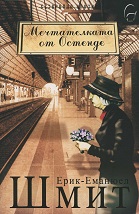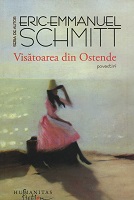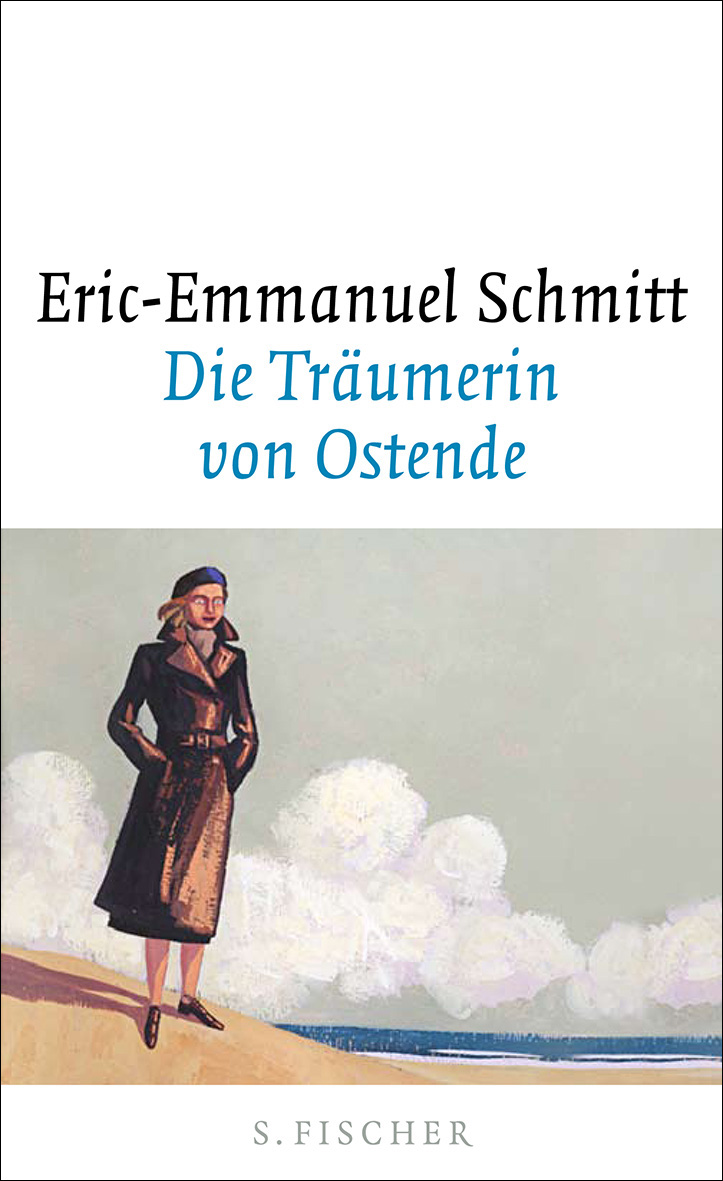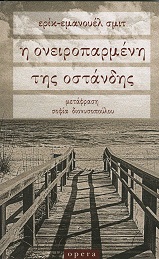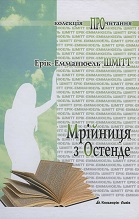Masterclass
Trailers
Monsieur Ibrahim et les Fleurs du Coran
x (x)
x (x)
x (x)
x (x)
x (x)
x (x)
View all trailers
Summary
To get over the end of a relationship, a man seeks solace in Ostend, a sleepy town on the North Sea coast. His landlady, the loner Emma Van A., tells him her lifestory, an astonishing account of romantic love and the most outlandish eroticism. Is she a supreme fantasist or a highly singular woman?
In these five tales, Eric-Emmanuel Schmitt reveals the power of imagination in our lives. All five --The Dreamer of Ostend, Perfect Crime, The Healing, Bad Literature and Woman with Flowers -- suggest that dreams are the stuff our days are made of.
Reviews
Lire - « Love is the art of living diligently with mystery »
He's the most performed French playwright in the world. Eric-Emmanuel Schmitt seems at peace, less hassled than formerly. He has, at least, time to meet me.
"It's so painful having this skull, this prison of unsaid words, this dark sanctuary inside my head! There are some words I could never bring out without collapsing," we read in the last story of this collection. What storms are unleashed in your head?
Eric-Emmanuel Schmitt. I keep my private suffering to myself. I only reveal the result, in other words, the trust and optimism I now feel. I don't feel any need to talk about my pain and suffering. Firstly, because I don't like the current trend of posing as a victim and the defence of pathos and cult of negativity. And secondly, because I find it more interesting to talk about what comes out of the difficult times we go through rather than harping on about what caused them. Basically, I can only talk about what makes me tick through fiction. Everyone has their own secrets and imbalances. I've reached the point where it's the secrets and imbalances that make me productive.
So is it essential to have secrets to become a writer?
E.-E.S. Yes, there need to be things that can't be expressed literally and that need literary expression in fiction or drama. If I put my life down baldly as it is, even just for myself, maybe some elements of suffering would disappear but I'd never be able to reach other people, you know, readers. But I think, too, that when you're a writer of the imagination, you write about yourself far more than a writer of ‘auto-fiction', paradoxically. I know Balzac better than Montaigne. Balzac never says ‘I' but he reveals his conception of the world and the contradictions of desire, whereas Montaigne, whom I love just as much, analyzes himself in relation to the world but doesn't say anything about his private world, to the point where you wonder if he even has a world... You can talk a lot more about yourself by hiding behind the mask of the characters you've invented, maybe because you feel protected, so you say a lot more about yourself. But you say it metaphorically, in images, symbols, stories and mythological tales. That's how you reach other people, in this roundabout way. These days, we live in the tyranny of sincerity: we're told that the value of a book comes from whether it's ‘authentic', ‘sincere', if it really ‘bleeds', and so on. But it's a scream! There's nothing more artificial than auto-fiction, nothing more controlled and protected. Whereas imagination is what really gives you away. Imagination is a text written by your desires, the things that make you tick and haunt you, so there's nothing more revealing than imagination.
So, there's no chance we'll ever read Eric-Emmanuel Schmitt's autobiography? Or diaries...
E.-E.S. Yes, I keep a diary.
Isn't that a bit paradoxical?
E.-E.S. It's a philosophical diary. It consists of constant thoughts about life, writing, the arts and the feelings I experience. It's closer in style to Michel Onfray's Hedonistic Diary than the diary of a writer of auto-fiction.
But you let down the barriers in My Life with Mozart (2005), coming back to your adolescent depression and suicide attempt then describing how you came late to Christianity...
E.-E.S. That's true, yes. Still, I stick to the idea that, in a story, it's not the author who's interesting but the story. So I try to keep myself as distant as possible and stay in the background. I gave a few clues away, it's true, but they are universal: depression, suicide, belief... it's a mirror for the reader to look in. And believe me, I don't look at myself in this mirror. I say ‘I' only when I feel that someone else can see themselves in the mirror of my ‘I'.
How do you manage your success?
E.-E.S. What is success? For me, it was the discovery that I was a man of my time, whereas I had thought, from my education (Latin and Greek, Ecole Normale Supérieure, philosophy) that I had escaped it. I belong to my century because I am celebrated by my century. Success has reconciled me to myself.
Does that mean you were unhappy with yourself?
E.-E.S. Let's say that I felt isolated. I didn't mind but I was isolated. You don't decide to succeed and you're not responsible for your success: I'm the author of my books, but it's the public who's the author of my success. In that way, success is a reconciliation with the era you live in and which you believe, a bit stupidly, you can escape. When you're successful, you find that you're less hurt by people's attacks: you've got the strength to shrug it off if you feel that the attack is wrong.
Are you hurt by the negative reviews some journalists give you apparently as a matter of principle - the ones who don't read your books or don't read them properly?
E.-E.S. No, not now. The paradox is that I was discovered and flattered by the press then demolished by it. When I had 400 copies, I was great; at 40,000 copies, I had lost my talent; at 400,000 copies, I was useless! In the eyes of some people, at least...
You're about to direct your own play for the first time in January 2008. Why has the writer decided to dabble in directing?
E.-E.S. I'm not having a go at directing to show my directors how to do it - I'm perfectly happy with them. I'm just greedy. And I want to go the whole way in the process of incarnation. My writing is peopled with characters. I want to take these characters right to the baptismal font of the audience. That's what I liked about producing the film Odette Toulemonde. Bergman said that the cinema is the theatre of faces. I loved bringing the body of a soul to the screen.
But in your novels or short stories, you never describe your characters...
E.-E.S. No, I suggest them. What I like is to set the reader's imagination to work with things that can't be described. Never describe, always suggest. It was Colette who said that. Suggestion demands major participation on the reader's part. But I think that's why readers remember my books so well, because I make them work.
How do you write? Do you have a different technique according to whether it's a play, a novel or a short story?
E.-E.S. My plays belong to the theatre of crisis and my novels are Bildungsromans. In the theatre, I make the arch support itself, because the time of a play is real-life time compacted down, it's an artificial time that doesn't exist, you need crises. When I don't need the thickness of time, a long period of time, I know that my story is right for the theatre. When the narrative needs the time of experience, i.e., when the story requires ruptures, discontinuity, duration, the time of mourning or self-reconstruction, or the rediscovery of another person, I know that my story needs the novel. For The Dreamer of Ostend, I spent a long time deciding: novel or short story? It's a short story that's the length of a short novel. But I have to say, I do have a bit of a problem with the novel...
Really?
E.-E.S. As a general rule, I find that most of the novels I read are lark pâté...
Meaning?
E.-E.S. 95% pork, 5% lark! (Laughter.) Lengthy short stories, stuffed with pointless dialogue, pointless descriptions, pointless details and adventures... When Monsieur Ibrahim and the Flowers of the Koran came out in the US, my American publisher asked me if I couldn't make the book three hundred pages instead of a hundred! In France, we have more respect for Voltaire's tales, aphorisms, letters and short works. In the literature of the 17th century, particularly, there's no pre-established format. The Dreamer of Ostend is a short story which I rewrote several times until I had whittled it down to no more than 120 pages, still keeping the narrative complexity. I took off the fat bit by bit until all that was left was what was strictly necessary. Short texts always cost me far more work than long novels.
In practical terms, how do you write?
E.-E.S. Over time, I've changed a lot. Before, I wrote in a fit of inspiration. I felt a sort of desperate urgency: I had to write everything down as fast as possible and get it published.
How do you explain this desperate urgency?
E.-E.S. I've seen so many people who wanted to write die before they'd finished so much as a single book. They might genuinely have had enormous talent and a major career before them. They had the same dreams I did and didn't live to bring them to fruition. That's what gave me this sense of urgency. If I lived, I had to deserve this life. Living creates a moral imperative. And a huge mental constraint: you don't have the right to waste time because everything can stop at the drop of a hat. That's why I wrote fast, in one great burst, forcefully, violently, barely stopping to reread what I'd written. Because I had to get on to the next work. Before it was too late. These days, I've probably matured. I hate taking too long to go over what I've written, it makes me feel like the classic navel-watching writer, but I do actually take the time to go over my work and refine it and refine it and refine it. That said, I publish a lot but I hardly ever write.
What do you mean?
E.-E.S. I compose all the time. I make up stories wherever I am. I've got stacks of books maturing in my head, but I only write a few weeks a year and only in the afternoon. I don't know anything about the ‘blank page' because I don't write! When I sit down to write, my page is instantly covered in black ink. As Racine said, ‘My tragedy is already there, all I have to do is write it down...' When I start writing, I always have the first and last sentences. Between the two, I compose. It makes me feel like a tightrope walker, someone tying their rope to a piton. I hammer the piton of the first sentence into the rock then travel along trying to scare myself, catch myself out, give the reader the impression that I'm going to fall... The first and last sentences of my novels and plays form the core. I let out the rope between them.
The main protagonist in The Dreamer of Ostend is another writer. Why do you so often put a writer on stage?
E.-E.S. The writer is a walking phenomenon, someone trying to discover other people's mysteries. He is interested and inquisitive about other people. I'm talking about the way I see writers, which is not necessarily the way they really are. Sometimes I've used outrageously egocentric writers. But for me, the writer is an explorer of humanity and emotions. In The Dreamer of Ostend, the writer has just got over the end of a relationship and he meets this old woman. A bond is forged between them: she tells him she just needs a bit of interest; he answers that he's her man because he can do that...
The Dreamer of Ostend is also about secrets...
E.-E.S. Secrets are vital to life just as they are to literature... Secrets are inner imbalances that set your juices flowing. The moment you give them away, you stop being productive. You have to protect secrets. I'll never give mine away. Except, perhaps, the day I say, ‘right, that's it, no more creating.' But that's not on the horizon yet.
It happened to another writer, Georges Simenon... And Julien Gracq...
E.-E.S. True. I'd like to know what it feels like. It must be terrible, living without creating. What would I do? I'd read.
What's the connection between prostitution and reading?
E.-E.S. This is something I believe very strongly: there are two ways of appeasing your curiosity about other people - sex and reading. When I was going through a phase when I couldn't write, I used sex to indulge my curiosity about other people.
You couldn't write?
E.-E.S. Yes. Between the ages of twenty and thirty.
Why not?
E.-E.S. I said I wasn't going to give away my secrets... Well, let's say I was writing but I wasn't happy with what I was writing. It was as though the two halves of my brain were separate: on one side was the philosopher-writer (I was a philosophy teacher at the time), which analyzed with sterile precision, and on the other was the writer puffed up with an over-active imagination and overblown lyricism. The two couldn't function simultaneously. At the time, I was a voluntarist. I couldn't agree to improvise myself the way I've now been doing for several years. I wanted to be a certain sort of writer, a great lyricist, which is something I'll never be. My reading of Sartre taught me voluntarism and my reading of Proust killed off any ambition to write a novel: Proust is the greatest architect of literature and when you read him you think there's nothing more to do. So I had two hang-ups caused by two of the writers I most admired. I was trying to marry the spontaneous writer I've always been with the philosopher I'd become. It took me till I was over thirty to become the writer I am today.
At the point when the right and left sides of your brain finally worked in tandem, would you say that sex and death played a key role?
E.-E.S. I'm not answering that question.
Have we touched on the secret you talk of?
E.-E.S. We're close. I may give you an answer, but in a few years... and if you don't publish it...
OK. Let's go on to the subject of this collection of short stories. Is there such a thing as ‘bad reading'?
E.-E.S. In the story called ‘Bad Reading', I imagine a teacher who never reads fiction or novels and who's killed off any imaginative life he once had. And, you know, there really are people like that. He's a serious gentleman who thinks that the novel is the domain of randomness. I admit that's what I thought at one stage in my life, when I was teaching at the University. Where is the source that makes what is said right? What is it that makes a writer not write any old thing? I thought about this for ages. I used to think the novel was very artificial. My character is the archetypal positivist reader, very intelligent but incapable of reading a novel or play because reading a novel or play demands more than intelligence, it demands imagination. This story shows that when you cut yourself off from your imagination, you lay yourself open to serious dangers. Bergson used to talk about the story-telling faculty, by which he meant the need we have to tell stories to make sense of our experiences, our lives, memories and imagination. The short story is a genre that is very well suited to playwrights: Pirandello and Chekhov are supreme examples. The short story gives writers back their power.
What do you mean?
E.-E.S. Playwrights control the time of a performance: an hour, an hour and a half, two hours... The audience is in the playwright's power: it's the playwright who manages their time. The novelist, on the other hand, doesn't have that control: he never knows if he'll be read in a single sitting or if the reader will abandon him altogether twenty pages into the book. In a novel of more than 100 pages, the writer knows the book will be read in chunks. But because a short story is rarely more than a hundred pages or so, you're back in charge of the reader's time. So, you can govern the mechanism of intellectual doubt, emotions, surprises, ruptures. In a novel, the rhythm has to be much more intense.
Your short stories read like a defence of the imagination, which isn't exactly fashionable. Nowadays, it's ‘sincerity' in literature that's the order of the day..
.E.-E.S. Nothing annoys me more! Sincerity is for witness statements, police statements... It's not quality, it's a duty! Sincerity is important for commitments and values. But in literature, it's poison! The only real question is: is this book interesting? Alternatively: is this story interesting? After that, does it matter whether the story is true or false? The issue of sincerity, of truth or falsehood, is by the way. I believe that imagination is the text of our true desires and impulses and the scenes that make up the structures of our mind. A person's imagination is the most original and authentic thing about that person. I couldn't care less about sincerity in literature, but I do seek authenticity, which, note, needs imagination. In that sense, lies are the ultimate expression of truth: when you lie, you say what you really want.
You even write that there's a proper use for lies: ‘It's better to lie than cause pain'. What is this ‘proper use' that comes into your books?
E.-E.S. That's right, it's an idea that comes into many of my plays, too. I'm a great fan of lies because a lie is not the truth about the facts but the truth about desire. It's the truth of the soul. But you have to bear the other person in mind: the respect you feel for the person you lie to should help you control the cursor of truth or lies. So, Diderot isn't lying when he tells his wife that when he sleeps with her, he's with her completely, he's not thinking about other women because he's already had them! His wife isn't a metaphor for the women he dreams about in secret... You've got to be a sophist.
Isn't that a bit makeshift?
E.-E.S. Of course it's makeshift, but moral philosophy is makeshift. It's the last word in The Libertine. In love, you can't apply theory to say you should do this or that, or this is good and that is bad. All you can do is cobble together according to the situation, by which I mean, decide, in your soul and conscience and with the knowledge you have of the other person, what you should and should not say. There are people who have to be told they're terminally ill and other people from whom you have to hide this truth, but you can't theorize about what to say. It's the same thing in love: lying can be necessary. And morals are a matter of cobbling, not of purity of intentions.
Let's talk about love, then. You write: ‘Some women are traps you fall into. Sometimes, you don't want to get out of the trap'. Why might you not want to get out?
E.-E.S. Love is the art of living diligently with a mystery. It's not satisfying (because you'll never get to the bottom of the mystery) but it's exciting. Loving is firstly about agreeing to excessive relations with another person, and then realizing that these relations will never enable you to know this person or possess them, it's just about living diligently with something that always escapes you, i.e., the person in their freedom, with their whimsical changes of heart, their ability to come and go, to say no. There's a quietist renunciation about love... in human love the same as divine love. What interests me is the irreversible attachment: you can't undo the relations even when your love-life becomes intolerable.
In that sense, loving and writing both involve living with a secret you have to accept without ever getting to the bottom of it?
E.-E.S. Yes, there's a strong similarity. Initially, there's an imperialism about writing, that's to say, a wish to get close to the secret, to reveal it, solve it. Then comes the period of humility, the moment when you realize that this secret is the very thing that makes you productive and you'll never get to possess it; indeed, you never should. Love is similar, you have to accept you won't possess the other person's secret and you realize that love grows stronger if you don't try to discover the secret. Literature tries to restore mystery not solve it, and I think love's the same. Philosophy tries to solve the mystery whereas art, on the other hand, celebrates mystery.
Not all philosophies. What do you think about the philosophies you've taught and that were so important to you, I mean the wisdom of the Classical world, hedonism?
E.-E.S. They're philosophies that have the humility of wisdom, they don't seek truth but well-being.
Is Eric-Emmanuel Schmitt a hedonist?
E.-E.S. Yes, but it's more complex than that. I feel very close to the hedonistic narrative, like Michel Onfray's, for instance. On the other hand, I part company from him when it comes to mystery. I think there's the promise of meaning but the meaning escapes me. Only, personally, I have faith in this promise of meaning. I did philosophy to cure myself of all forms of ideology, including atheist ideology, which I don't share. I've got huge respect for non-belief and atheism but I'm an agnostic who believes. When I'm asked, ‘Does God exist?' I refuse to answer categorically. I say: ‘I don't know, but I think so.'
Let's come back to human love. Your dreamer of Ostend writes to the author: ‘You never get over a critical love affair. If you get over it, it means that it was pretty pointless in the first place.' Does that mean you can't get over the end of a love affair?
E.-E.S. No, you just have to live alongside it. You go on to other experiences but you don't get over it. Otherwise, it's true: it wasn't important, it was a waste of time. I believe that very strongly. You just live with it.
Even if you meet someone else?
E.-E.S. Yes, and the other person knows and lives with the knowledge.
Co-habitation, in that case?
E.-E.S. Yes. Because there comes a time when that unique experience is put in a separate bedroom, a room you have less and less access to. Like a mausoleum. And to be able to live again, you ban entry to that room.
So, do you have to lie to the other person?
E.-E.S. Silence. It's about silence. I practise silence. You shouldn't burden the newcomers in your life with the weight of your past, your regrets and basic nostalgia. And that's what love is, too: not burdening new lovers with a weight for which they are in no way accountable; trusting the future.
Are you an optimist?
E.-E.S. Definitely.
François Busnel
L'Express - « Stories from Uncle Schmitt »
Big head, big print-run!...Five superb tales to rival those in the best Anglo-Saxon story-telling tradition. Once again, Eric-Emmanuel Schmitt holds the reader in thrall to the beauty of his art.
Delphine Peras
Femme actuelle - « Every one a winner »
Powerful, concentrated tales... Schmitt's expert handling of the short story places him firmly in the class of great writers to have tried their hand at the genre, from Maupassant to Flaubert and Edgar Allan Poe. This is a subtle craft with pre-established rules, and Eric-Emmanuel Schmitt has fully mastered the codes. Suspense, the art of the fall: they're all there and function seamlessly. Reading the stories is like dipping into a box of chocolates, with each one releasing its own distinct and refined flavours.
Sarah Gandillot
Le magazine littéraire - « The Dreamer of Ostend »
The short story is a literary genre in its own right. The risks of producing something concise but dull, elegant but hollow are not negligible. Eric-Emmanuel Schmitt has turned his hand to the format with the serene audacity that characterizes his work.
In the brief tales that make up his latest book, The Dreamer of Ostend, he invites us into a realm that combines elements of epic poetry with those of detective fiction and fable. These extraordinary narratives are remarkable for their constantly shifting styles and for the way they endlessly postpone the heaviness of reality, offering instead a subtler vision and refusing from the outset any indications that might help distinguish the real from the imagined world. Hence the strangeness of Woman with flowers, which is structured like a riddle. For years, a woman has waited at a station, clutching a bunch of flowers. Her waiting presence is emblematic and full of foreboding, the ending cruel, but the story fully illustrates the author's consummate skill as a story-teller.
Such limpid writing, such lightness of touch with the characters' emotions could give readers the wrong idea, for the fictional universe darkens as soon as the characters' dreams and illusions disperse. It comes as no surprise that a driving force behind these stories from the pen of a seasoned playwright is the art of dialogue. The characters' words bring the tales alive and lend them an energy and a specific structure. Their confidences frequently involve vague aspirations, crazy desires and unverifiable biographies.
Schmitt is more interested in how people perceive their lives, in their fantasies and private myths than he is in constant reference to reality. At times recalling the grace and elegance of Giraudoux, his profuse writing and hunger for reality in all its forms nevertheless often results in a Baroque vision, in a play of mirrors and masks. In ‘Bad Reading', the murder that concludes the story is simply the product of a series of misunderstandings and illusory images that lead the main protagonist astray. For the trouble is, this maze of illusions has more power and authority in the eyes of the individual than the real world.
Again and again, these tales and fevered or elated confidences demonstrate that the dreams that haunt the characters are not just ephemeral visions or illusions but the charm of life itself, the necessary stimulants for action. Eric-Emmanuel Schmitt hits just the right tone to express this idea adroitly.Didier Raymond
JDD- Version fémina - « Dominique Bona recommends »
...In these five tales, as striking as they are mysterious, Eric-Emmanuel Schmitt deploys his outstanding talent for story-telling and his boundless capacity for fantasy and imagination. The book swings between detective story and romance, offering a vision that is both tender and cruel. The author of Oscar and the Lady in Pink has learned all there is to know about the art of narration and portraiture. This is a book with which to curl up by the fire and luxuriate in the dreams and beliefs of its universe. What more could one ask?
Dominique Bona
Publishers Weekly - « Observes uncommon relationships, from the intense to the fleeting »
Schmitt's mostly pleasant collection of five stories (after The Most Beautiful Book in the World) observes uncommon relationships, from the intense to the fleeting, beginning with "The Dreamer from Ostend," in which the narrator, recovering from a breakup, lodges with the aging, wheelchair-bound Emma Van A. At first, the narrator believes Emma is trapped in her book-filled home and has lived a largely vicarious life--until Emma reveals an amazing, if possibly untrue, secret. In "Getting Better," Stéphanie, a young Parisian nurse, is captivated by a middle-aged patient after he pays her an unexpected compliment. The narrator of the title story notices an elderly woman who comes to the Zurich train station every day clutching a bouquet of flowers, as if waiting for someone. After speculating with his co-workers over her situation, Eric realizes they are imposing their own life stories onto the woman. Each of these stories hinges on human connection and does the required work of illuminating their protagonist's lives, though the uniformity in aesthetic--quiet, deliberate, mannered--sometimes feels uninspired.
Mostly Fiction - « Very entertaining »
The woman stands on platform number three in the Zurich railway station with a bouquet. She’s been doing the same thing for fifteen years according to the locals. Whom is she so patiently waiting to meet? Does she expect a representative of love or death to alight from the railcar?
In this title short story, “The Woman with the Bouquet,” Eric-Emmanuel Schmitt blends his trademark elements of fairy tale romance, pathos, and fatedness. It radiates mystery and romanticism but also a ghostly bit of menace, and it cuts to a marrow of sorrow. It appeals to our curiosity about the “obsessing” people in this world who will not be moved from their own missions, and simultaneously it reminds us that time spent waiting for something is time not spent doing something else more “constructive.” Loyalty and love would seem to be the motivators of the woman, but perhaps she just is retiring from the world by standing there every day?
The Woman with the Bouquet contains, besides the story just discussed, one novella and three other short stories. It opens with the novella, “The Dreamer from Ostend,” about Emma Van A., an old woman who “must have been very beautiful” but due to a recent cerebral hemorrhage, “her muscles had melted” and her “joints were ravaged by arthritis.” Emma secreted herself in her father’s library of classics and “read in order not to find herself alone and adrift…not to fill a spiritual void but to accompany an all too powerful capacity to create.” Although very secretive about her past apparently devoid of lovers, she relents and tells her history to a writer (the novella’s narrator) who is a boarder in her house, trying to recover from his recent romantic breakup. Hers is a fantastic tale of a secret love that reminds the writer of Cinderella (without the happily-ever-after ending). He has the temerity to tell Emma he doubts her. “The Dreamer of Ostend” is a modern fairy tale infused with literary and psychological insights. The question of whether Emma was indeed beautiful as a young woman comes up, and the narrator doesn’t see how the world order he knows could have handed her the romantic adventure she claims. Emma’s “need” to read only books by dead, “tested” writers is a way she tries to stay out of the present and remain dreamily in the past she claims for herself. Yet she hoped to perpetuate her past by passing it on to the writer. Will he find a reason to be persuaded after all?
“Perfect Crime” begins with a decades-married couple hiking on a high cliff: “The winding path grew perilously narrow a hundred yards further up the slope overlooking the valley.” The wife, Gabrielle, has been feeding her own suspicions about her husband for some time, and now she looks around and, seeing no witnesses, decides it is time to send her husband into the abyss. This is Gabrielle’s story of the aftermath of that decisive moment. Her husband kept secrets from her and she needs to find out once and for all what sins against her they prove. She also has to reevaluate the venomous advice she got from a woman called Paulette who once told her about men that “you really have to push them to the brink to see what they’re made of.” In “Perfect Crime” Schmitt gives us a woman whose suspicious mind and inability to be happy may have led her far, far astray.
Schmitt sometimes focuses on people who are very self-conscious about their appearance and who sequester themselves from life as a result. “Getting Better” carries that theme. A Parisian nurse who is has low self-esteem and considers herself “in the fat lump category,” is startled when a paralyzed and blind male patient tells her, “Lucky me, to have such a pretty woman looking after me…” By caring for him, she knows he was a virile and handsome man before he became so incapacitated. And his women were model perfect to judge by the ones who come to visit him. So why does this man who can’t see or touch her think she is pretty? Asking herself this question causes her to make changes in her wardrobe and her outlook. But is she exchanging withdrawal from the world for an unrealizable attachment? Will love grow fully or be pruned into something else?
And then there is “Trashy Reading,” a manic, black spoof about the “consequences” of reading eight-hundred page blockbuster novels by writers with single-syllable names like “Chris Black” and “Dan West.” Maurice Plisson, a professor with no private life to speak of, tells one of his students scornfully, “Stuff and nonsense!…Those who write novels are writing for a population of idle women, no one else….You see, novels reflect the reign of the arbitrary, complete vagueness. I’m a serious man. I don’t have the place, or the time, or the energy to devote to such nonsense.” Well, of course this stuffed shirt, while on holiday with his female cousin, is drawn like iron filings to a magnet to a trashy novel she buys: The Chamber of Dark Secrets. And that turns Maurice’s previously staid life into one in which he sees danger, intrigue, and murderers all around him.
The Woman with the Bouquet deals with characters who limit themselves by pomposity, pride, fear, insecurity, and suppressed anger. Yet, into the lives of these fragmented, sometimes broken people come extraordinary (even miraculous) events that inspire them to break out of their cocoons and take wing. The results run the gamut from transcendence to tragedy.
Schmitt’s previous Europa Editions volume of stories, The Most Beautiful Book in the World, had a draft feel to it because Schmitt had written most of it hurriedly during the filming of the title story. This collection, although it features many similar themes, feels more finished, more polished. One can quibble with a few of the author’s plot decisions (particularly, in “Perfect Crime,” the revelation of a much touted secret of the husband’s — it falls short of expectations). However, this set of stories is very entertaining and arguably creates its own niche in literature because it melds a number of genres so unconventionally. I enjoyed it.
ForeWord Reviews - « The stories Schmitt supplies offer something to live by. They read like modern fairy tales. »
“Literature like bloodletting, to avoid fever.” The Woman With the Bouquet is for those who share this regard for literature, who see it as a salubrious—yet potentially dangerous—endeavor. Schmitt’s is a book for companions of books. His characters are surrounded by tomes, and they base their lives on them. The stories Schmitt supplies likewise offer something to live by. They read like modern fairy tales.
“The Woman With the Bouquet,” for instance, is one part mystery and one part fable, complete with its extractable lessons: “What is interesting in an enigma is not the truth that it hides, but the mystery that it contains.” The story—which is by far the shortest in the book, running only eleven pages—explicates this lesson and another: that the life one projects onto another is likely to be one’s own. As such, Schmitt’s book is a rebuttal to one of his character’s claims that there is nothing to be learned from a work of fiction.
For readers looking for the edification that literature can bring, Schmitt provides. Although his name may be new to some American readers, Eric-Emmanuel Schmitt is one of the most popular contemporary French authors in Europe. This collection of short stories was first published in French in 2007 (with the first short story as its cover title—La Rêveuse d’Ostende, or “The Dreamer From Ostend”), and it was well received. Schmitt is also a renowned dramatist; winner of the French Academy’s 2001 Grand Prix du Théâtre, his plays have been staged in more than 30 countries.
As one might expect from a contemporary dramatist, Schmitt’s style is not language-oriented and is, instead, read-aloud ready. His stories are easily accessed. That said, Schmitt attends to words and follows where they send the mind. An apparent lover of books, he seems also to be a lover of letters. Speaking of the word “Ostend,” he relishes each sound: “Because the word began with an O of surprise, then grew softer with the s, it anticipated the sensation of bedazzlement as I stood on a sand beach stretching to infinity…”
While infinity remains in view, Schmitt explores the finitude of human life. With Flannery O’Connor’s penchant for rendering the misfits and the afflicted, Schmitt’s characters have emotional vulnerabilities that become as observable as their bodies’. Going through these pages has the effect of a blood transfusion—letting another’s life in. (September) Janelle Adsit
Publications
- In English language (USA, Canada, Puerto Rico et les Philippines), published par Europa
- In German language, published by Ammann Verlag
- In Bulgarian language, published by Lege Artis
- In Greek language, published by Opera
- In French language, published by Albin Michel
- In Italian language, published by e/o
- In Dutch language, published by Uitgeverij Atlas
- In Polish language, published by Znak
- In Russian language, published by Azbooka
- In Ukranian language, published by Calvaria
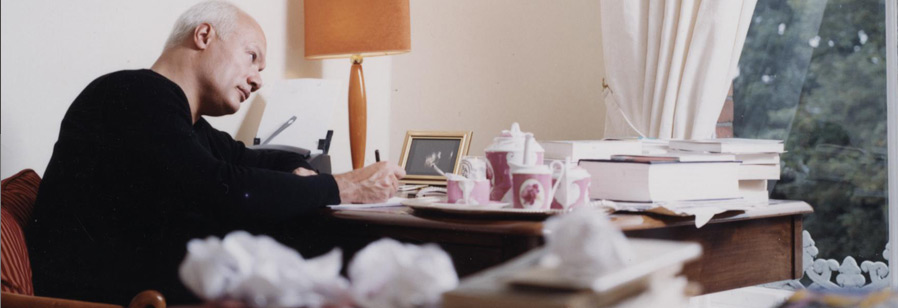
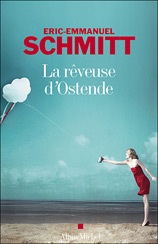
.jpg)
